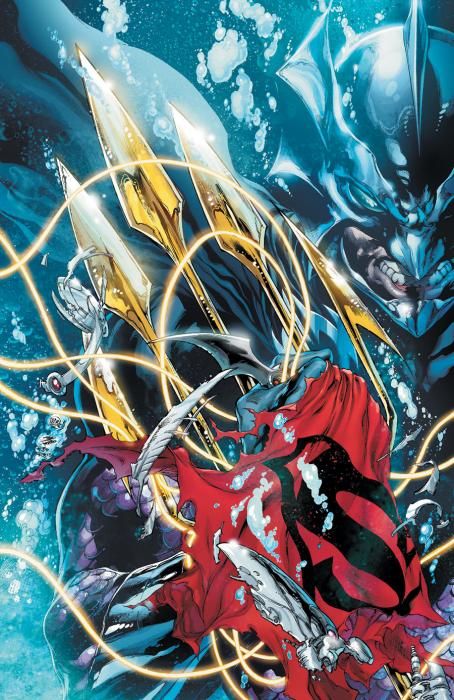After the climactic, well-executed plot twist at the end of "Aquaman" #17, Geoff Johns, Ivan Reis and Paul Pelletier deliver an unsettling, open-ended conclusion to the "Throne of Atlantis" crossover in "Justice League" #17.
The greatest flaw of "Throne of Atlantis" is that some of its epic promise is left unfulfilled as Johns tries to balance scale and depth. "Throne of Atlantis" partly presents and sells itself as a typical crossover with multiple battle mashups, but it's really not that kind of story at all. While Superman, Wonder Woman, Batman and the heroes that Cyborg recruited are present in the battle melee of "Justice League" #17, they get only brief flashes of the spotlight. This expanded cast may spill over into future issues of "Justice League," but most players, new and old, get short shrift here, since they are pawns and not the king needed to end the game. Reis does great work on these opening pages, keeping the action exciting and clear across panels full of bodies and fighting.
"Throne of Atlantis" has been true to its name, focusing on Aquaman's brother and his divided loyalties instead of the surface world. Johns' script for "Justice League" #17 isn't as tightly or delightfully plotted as "Aquaman" #16, but there are some quieter twists and Johns' characterization is excellent. From the first page to the last, "Justice League" #17 reads more like an issue of "Aquaman," with Arthur and Orm occupying center stage, and accordingly, these two characters reap the benefits of Johns' dialogue. The true villain, Vulko, is Atlantean too, but he gets surprisingly little play in this final chapter.
Orm, The Ocean Master, shows himself to be cavalier about human life, but he remains a sympathetic antagonist to the end. Johns, Reis and Pelletier deliberately play up Orm's likability. The deaths he causes are faceless humans instead of anyone that would matter more to the reader. In some philosophies of war, Orm's actions are justified, since he acted under the earnest belief that he was retaliating and acting to prevent further harm to his people.
Orm puts Atlantis first, but he is obviously attached to Arthur and vice versa. Orm's face is unveiled when he is beaten and chooses to yield to his brother, and Reis does a great job of making the most of Orm's humanity and vulnerability in this scene. Finally, Pelletier's composition and body language get across Orm's despair and isolation in one of the closing scenes, and here Johns twists the knife by having Orm ask for his brother.
As for Aquaman, he wears his responsibility reluctantly but well, ending the battle decisively and making painful, imperfect choices because he must. The transfer of power from Orm to Arthur was heavily foreshadowed, but Johns and Reis make the moment feel dramatic and exciting. The resolution, especially Orm's uncertain fate, feels unjust and unfinished, and the battle between Atlantis and the Justice League was worse than it had to be because people on both sides were quick to judge and trigger-happy. However, these observations apply to real wars and not just comics, so these aren't aesthetic flaws, although they may leave the reader feeling unsettled.
Overall, "Justice League" #17 is a strong finale, with suspense from its emotional punches and serious consequences for Aquaman's immediate future and the roster of the Justice League.

